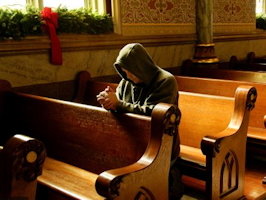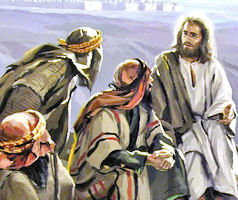» Enjoy our Liturgical Seasons series of e-books!
Jesus said to his disciples: "Do not let your hearts be troubled. Trust in God still, and trust in me. There are many rooms in my Father's house; if there were not, I should have told you. I am going now to prepare a place for you, and after I have gone and prepared you a place, I shall return to take you with me; so that where I am you may be too."
Sunday Readings
The first reading is taken from the Acts of the Apostles 6:1-7 and continues the description of the missionary preaching and missionary activity of Paul and Barnabas. For those who follow the reign of God as inaugurated in Christ, these apostles can promise nothing for sure but trials and hardships. And yet, the paradox of suffering and yet being joyful in the Holy Spirit is here expressed as it was in the ending of the readings from Acts last week. — A Celebrants Guide to the New Sacramentary - A Cycle by Kevin W. Irwin
The second reading is from the first Letter of St. Peter 2:4-9 in which he reminds the new converts to Christianity, that they must be holy, for they are the living stones out of which the new spiritual temple of God is formed. The cornerstone, the base and binding force of this temple, is the risen Christ. . Because of him, and through him, they are able to offer sacrifices which are acceptable to God.
The Gospel is from St. John 14:1-12. We may well wonder at the slowness of the Apostles in seeing in Christ nothing more than a man—a great man, a man with power from God, yes, but still a mere man. That he was the Messiah, they were convinced, but their idea of the Messiah was wrong. They thought he would free Israel from foreign domination (Lk. 24 21), and set up a new kingdom of God—a prosperous, earthly kingdom with God guaranteeing peace and plenty for all. If, therefore, he allowed his enemies to put him to death, all their hopes would be dashed to the ground. Hence, the mention of his impending death at the Last Supper filled them with dismay and despair.
But we must not judge them too harshly. Christ had indeed often claimed to be God, but his words fell on deaf ears. It was only after his resurrection that they began to understand that he had spoken literally—it was only then they believed he was indeed the Son of God, in human nature.
For us today, the Incarnation is still a mystery, but it is not the "how" that should trouble us, we know that with God all things are possible. It is rather the "why" that should cause us amazement. Why should God go to that length for our sake-mere creatures, and sinful, ungrateful creatures at that? The infinite goodness and the infinite love of God are the answer, but still an answer which is mysterious to us. For we, with our limited capacity for love, can form no idea of infinite love.
God created us "in his own image and likeness" (a very limited likeness, granted) and intended, because of the spiritual faculties he gave us, which enable us to see and enjoy truth and beauty, to give us a share in his eternal life and glory. To do this, the Incarnation of the second Person of the Holy Trinity was God's plan. There must have been other ways of doing this, but God, we can be sure, chose the best way. Even with our limited intelligence, we ourselves can see what a perfect way this was for proving to us the infinite love, goodness and compassion of our Creator.
Sin entered the world of man, as God had foreseen, but notwithstanding this ingratitude on our part, God's Son came in our lowly, human nature and suffered, even though sinless, all the effects of men's sins. He suffered in our name, and because he was God, his sufferings in his human nature made infinite atonement for the sins of all mankind.
His Incarnation had made us his brothers and' co-heirs to heaven. His death on the cross wiped out, and gave us the means of wiping out, our sins, so that we would be capable of possessing our inheritance.
Knowing the story of the Incarnation therefore, we know of the love and kindness of God toward us. We need not ask, with Philip, "show us the Father," we have seen him in his riches and wisdom and knowledge of God! "How unsearchable are his judgments and how inscrutable are his ways!" (Rom. 11 :33).
"What return can I make to the Lord?" All the mortifications and good works of all the holy met and women that ever lived, or will live, would not be adequate a return to God for the miracle of love he has shown toward us. But he accepts the widow's mite, the little acts of love, the little proofs of gratitude, the willing acceptance of the crosses he sends us, to purify us. In one word, all he asks in return is that we try to live our Christian life day after day, ever thanking him for the gift of Christ and the Christian faith. — The Sunday Readings by Fr. Kevin O'Sullivan, O.F.M.
Meditation for the Fifth Sunday of Easter: Christian Spirituality
 The glorification of Christ was not completed by His resurrection from the dead. He goes to the Father also as man, that He may take possession of His throne and, as the glorified Savior, share with God dominion over the world. "Sing ye to the Lord a new canticle" (Introit). He withdraws His visible presence from His disciples and from His Church that He may send them the Holy Spirit in His place. But by means of the Holy Spirit, He will always remain with them invisibly and spiritually. "If I go not, the Paraclete will not come to you; but if I go, I will send Him to you" (Gospel).
The glorification of Christ was not completed by His resurrection from the dead. He goes to the Father also as man, that He may take possession of His throne and, as the glorified Savior, share with God dominion over the world. "Sing ye to the Lord a new canticle" (Introit). He withdraws His visible presence from His disciples and from His Church that He may send them the Holy Spirit in His place. But by means of the Holy Spirit, He will always remain with them invisibly and spiritually. "If I go not, the Paraclete will not come to you; but if I go, I will send Him to you" (Gospel).
"I go to Him that sent Me" (Gospel). Jesus withdraws His visible presence from His disciples and from His Church. They must free themselves from their attachment to His human form; they must give up the comfort and the solace of having Him physically near them and associating with Him. They, too, must become spiritualized. Then only can He send them His Holy Spirit and make them bearers of the Spirit. They must acquire the strength of the Spirit if they are to become the rulers of the world and comfort mankind in all its trials and difficulties. "I go to Him that sent me." This is a call to become more spiritual, to become detached from all that is worldly.
In our piety we all too often act in a manner that is not spiritual, even with our Lord. We long for His sensible presence, for sensible devotion. We wish to have Him speak to us audibly and give us real visions or some tangible manifestation of His love; we long for sensible graces and consolations of many sorts. This is an unsound sort of spirituality, based on sensible devotion. But Christ tells us, "It is expedient to you that I go." We must become more spiritual: that is the lesson taught by the liturgy during the time before Pentecost. We are taught that we must lift up our hearts to the glorified, heavenly Christ, and free ourselves from all that is perceptible to the senses, and live for the life above. We must seek a spirituality based on the spirit of faith and on a determined effort to overcome all our selfish desires and tendencies. Our spirituality must be based on a love that attends to God alone and occupies itself entirely with what comes from Him and leads to Him. "It is expedient to you that I go; for if I go not, the Paraclete will not come to you."
"I will send Him to you." Jesus leaves us; but since He is no longer bodily present, He sends us His Holy Spirit. He merited for us this greatest of all God's gifts, the Holy Spirit, through His suffering and death. Now He ascends into heaven that He may send Him to us as our comforter to take His place. But the Holy Spirit has not come to protect us from all suffering and adversity, from temptation and difficulties. He comes rather to fill us with the strength to live and work for Jesus under all circumstances; that is, to work in the spirit of truth and humility. He comes to help us live in voluntary poverty, humility, and suffering. In a word, the Holy Spirit comes to help us conform our lives perfectly to the life of Christ. The Holy Spirit induces us to live in Jesus and for Jesus. He makes us witnesses (martyrs) and this spirit we gladly embrace ridicule, injustice, suffering, the loss of our possessions, and even the loss of our life. How much we stand in need of such a helper and comforter! How fervently we should pray during this week that God may send this blessed comforter to us and to His Church!
With the newly baptized we perceive the sensible presence of the Lord in the great festivities and symbols of Easter day. Now the liturgy seeks to lead us from the joy of Easter back to the struggle and the sufferings of the world. She seeks to anchor our hearts in heaven, to elevate them above attachment to the world and the love of mere temporal things. She seeks to lift our hearts to heaven, "where true joys are to be found" (Collect). For us who are Christians, a higher world, a world of eternity, is the one reality. To help us reach that world, the glorified Lord sends us the Holy Spirit. We long for His coming and cry without ceasing: Veni, Sancte Spiritus: "Come, Holy Spirit, and fill the hearts of Thy faithful."
The most effective means of acquiring true Christian spirituality is through participation in the Mass. We must renounce our personal, human, egotistical spirit, and rid ourselves of all that is worldly and transient. For this reason we receive the Holy Eucharist, which is the spiritualized and glorified flesh and blood of the Lord, who pours forth the wealth and the riches of the Holy Spirit upon us.
—Benedict Bauer, O.S.B, from The Light of the World, Vol II, Fourth Sunday after Easter






